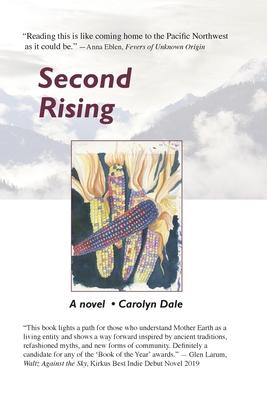A novel in the environmental literature genre, Second Rising combines a mystery, a love story, and a fight against injustice. The narrator, Lauren, is a young chef who buys a restaurant in the town of Quicksilver in the Cascade Mountains of the Pacific Northwest. She soon becomes entangled in the community's fight to preserve their farmlands and way of life, which includes roaming the forests of nearby Mount Baker. A technology mogul has bought vast swathes of land for a project he keeps secret while wresting control of the local government and promising residents new jobs and prosperity. Aligned with international agribusiness, he closes the forests and threatens the local organic farmer who supplies Lauren's restaurant; even the local wild salmon run is endangered. As the community divides into bitter struggle, some choose active resistance, including a bombing and the suspicious death of the mogul's security chief; but Lauren finds strength through her deepening connection to the land. Help arrives in mysterious ways: The town's legendary White Deer appears in the forest, Tibetan monks arrive to make a mandala and spread its blessings, and local Kulshan Indians arrange for Lauren to journey to the Southwest and bring back blue corn with an ancient heritage. Lauren is falling more in love with Grant, a geologist who works for the tech mogul but must make an ethical break when he discovers his employer's true motives. The community is also pulling together, and while a reclusive shape-shifter is at work, and a gemologist nurtures seeds from old amber, more practical residents gather to organize a new city based on innovative ideas and approaches. Inspired by the question, How shall we live, if we truly believe the earth is alive? the characters are buoyed by energy that flows when they act as part of the earth's living systems. Through struggles and crises, the townspeople prevail in the optimistic conclusion. The novel, 436 pages, evokes motifs of European, Asian, and Native American mythologies and vividly describes the land, mountain, and rivers as characters themselves.

A novel in the environmental literature genre, Second Rising combines a mystery, a love story, and a fight against injustice. The narrator, Lauren, is a young chef who buys a restaurant in the town of Quicksilver in the Cascade Mountains of the Pacific Northwest. She soon becomes entangled in the community's fight to preserve their farmlands and way of life, which includes roaming the forests of nearby Mount Baker. A technology mogul has bought vast swathes of land for a project he keeps secret while wresting control of the local government and promising residents new jobs and prosperity. Aligned with international agribusiness, he closes the forests and threatens the local organic farmer who supplies Lauren's restaurant; even the local wild salmon run is endangered. As the community divides into bitter struggle, some choose active resistance, including a bombing and the suspicious death of the mogul's security chief; but Lauren finds strength through her deepening connection to the land. Help arrives in mysterious ways: The town's legendary White Deer appears in the forest, Tibetan monks arrive to make a mandala and spread its blessings, and local Kulshan Indians arrange for Lauren to journey to the Southwest and bring back blue corn with an ancient heritage. Lauren is falling more in love with Grant, a geologist who works for the tech mogul but must make an ethical break when he discovers his employer's true motives. The community is also pulling together, and while a reclusive shape-shifter is at work, and a gemologist nurtures seeds from old amber, more practical residents gather to organize a new city based on innovative ideas and approaches. Inspired by the question, How shall we live, if we truly believe the earth is alive? the characters are buoyed by energy that flows when they act as part of the earth's living systems. Through struggles and crises, the townspeople prevail in the optimistic conclusion. The novel, 436 pages, evokes motifs of European, Asian, and Native American mythologies and vividly describes the land, mountain, and rivers as characters themselves.